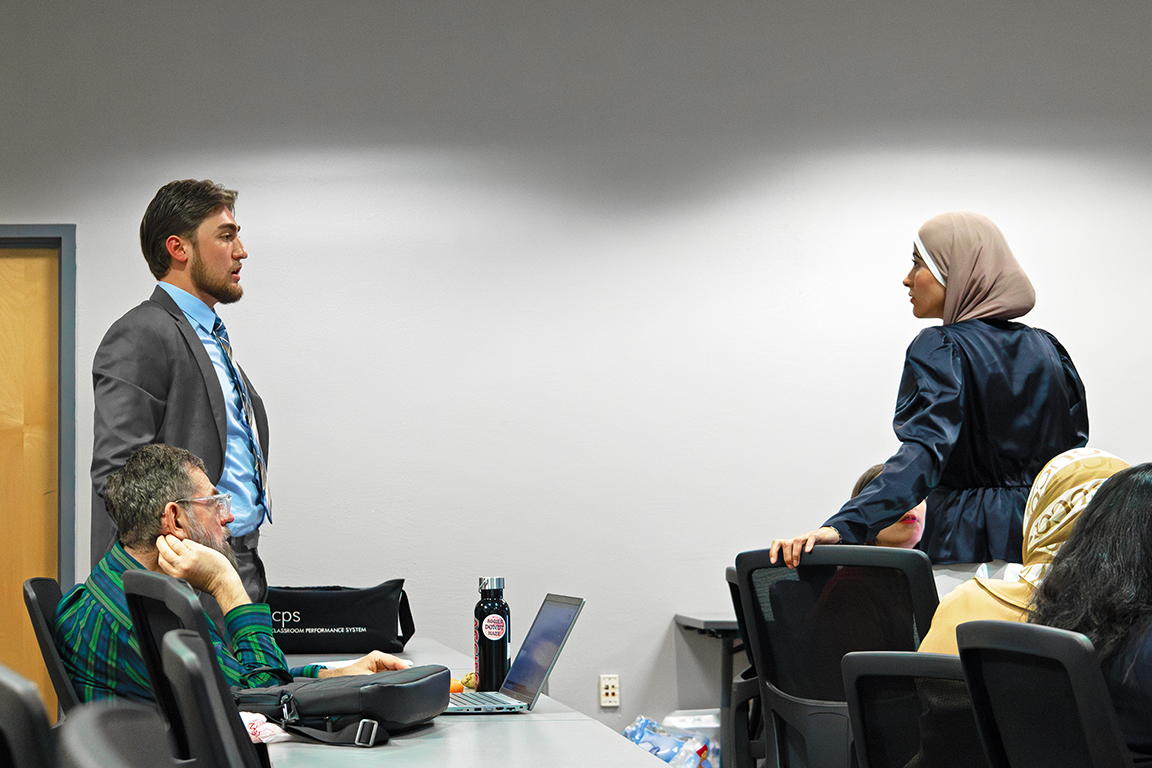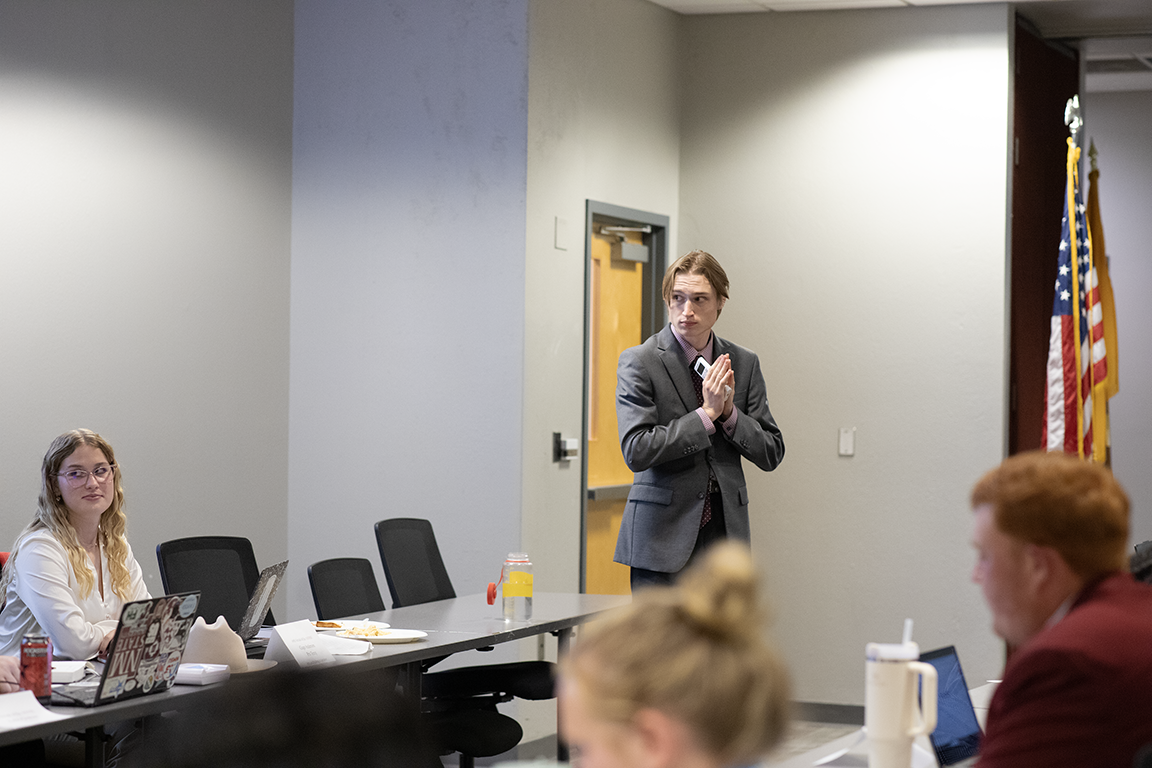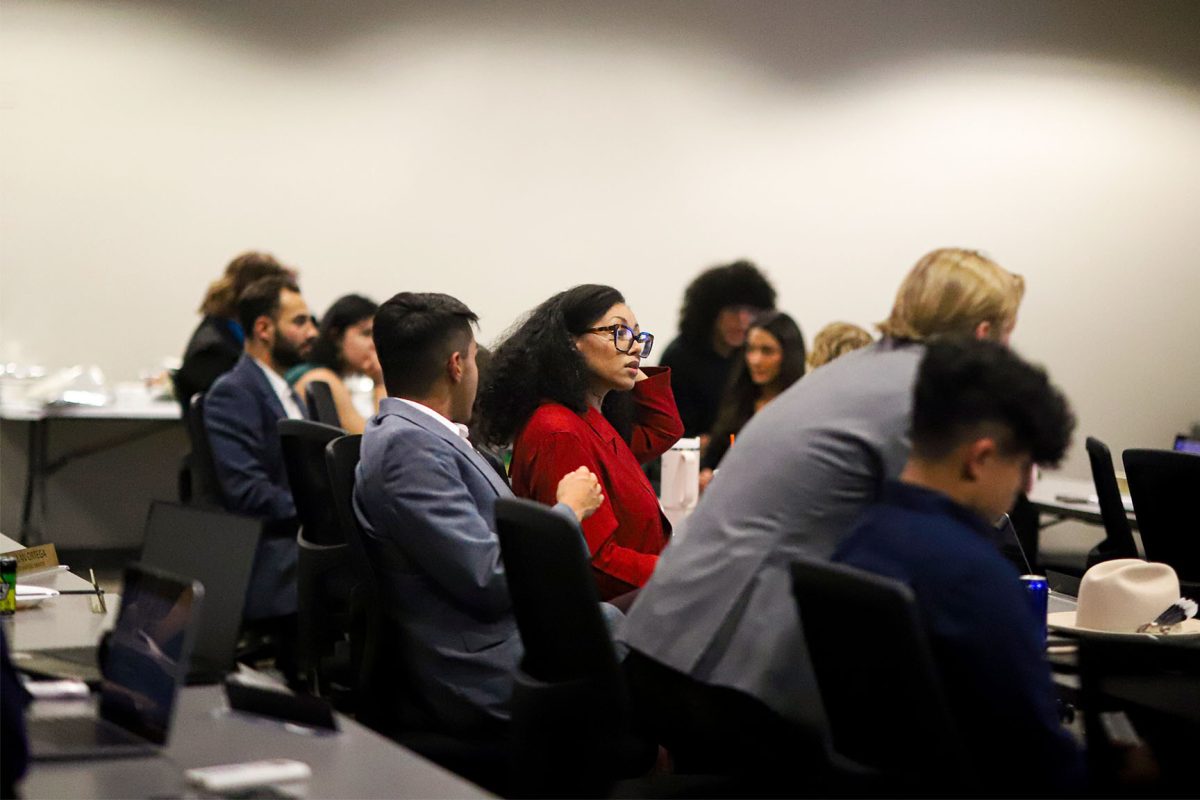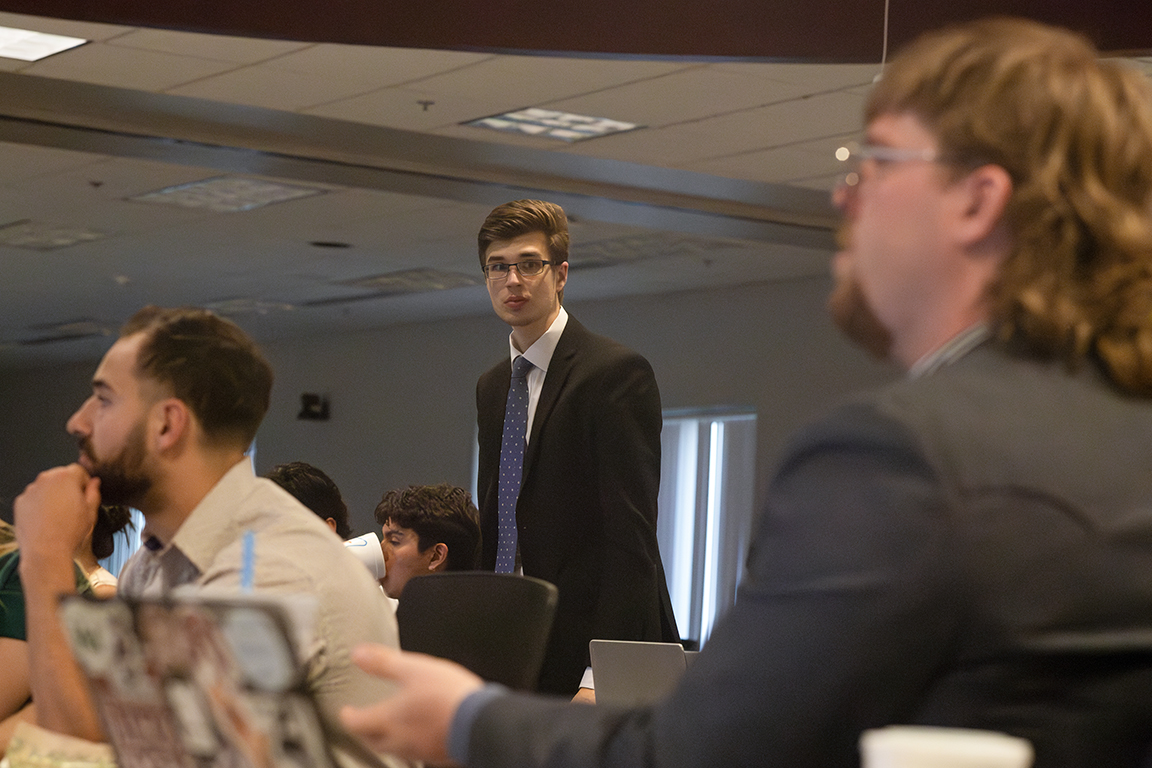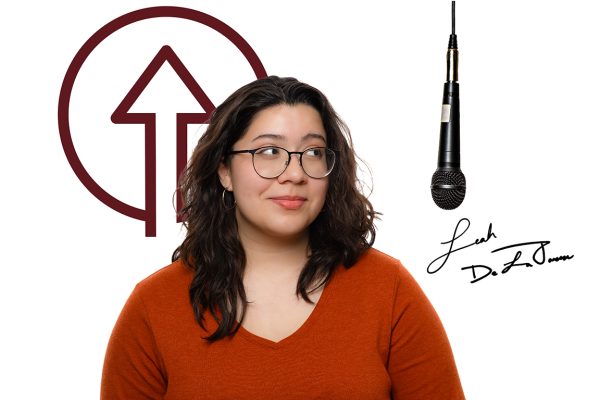After a back-and-forth spring election cycle, the 67th Senate of the Associated Students of New Mexico State University swore in incoming senators and a brand-new executive cabinet on Thursday, April 25.
The swearing-in ceremonies marked the official end of a disorderly election cycle for several candidates. Questions of bias and the association’s understanding of state law came into full view during the spring election period.
As The Round Up previously reported on April 16, the ASNMSU Supreme Court was scheduled to hear testimonies of then-disqualified presidential and vice-presidential candidates, Ala Alhalholy and Elida Miller.
Both candidates were disqualified by the ASNMSU election board on Friday, April 12, in which the election board cited the pair’s election violations. Both candidates were then informed they would have to complete community service hours, and Alhalholy was to issue a public apology for misleading voters.
Alhalholy’s and Miller’s violations raise controversy
For context, Alhalholy had a total of 11 election violations, and Miller had six. Fellow candidate Anisa Sanchez and Christopher Hamilton had nine violations. Javan Hollins and Alex Duran received several, as well as Jay Choate, who dropped out of the election.
The Round Up was able to obtain and view copies of both Alhalholy’s and Miller’s violations. The majority of them cited intimidating and misleading voters. Both candidates denied these claims and said their campaign adhered to ASNMSU bylaws.
One of the most common violations for Alhalholy and Miller came from a campaign event following an NMSU Athletics practice. Several violations cited that both candidates claimed to be “the only candidates that cared about athletics.” This set of violations was addressed in rounds of questioning during election board hearings and in Alalholy’s and Miller’s supreme court testimonies.
Several names of those who filed election violations were redacted to protect student confidentiality and privacy.
Alhalholy mentioned that she felt targeted by fellow candidates and the association. She expressed that while she can’t say for sure, she believed the violations filed against her came from members in the association, and not from concerned students.
“I didn’t need to know who wrote them, I know who did,” Alhalholy said. “There was not a violation that I had that came from a concerned student.”
Candidate disqualification proceedings
On April 16 and 17, the court held their proceedings in the Corbett Center Student Union, which attracted a large public turnout. Both Alhalholy and Miller expressed their faith in the court to make the right decision based on the evidence presented.
On April 19, the ASNMSU Supreme Court reversed the election board’s decision to disqualify the presidential and vice-presidential candidates, which officially confirmed their spring electoral victory. Chief Justice Rafael Loera delivered the opinion of the court.
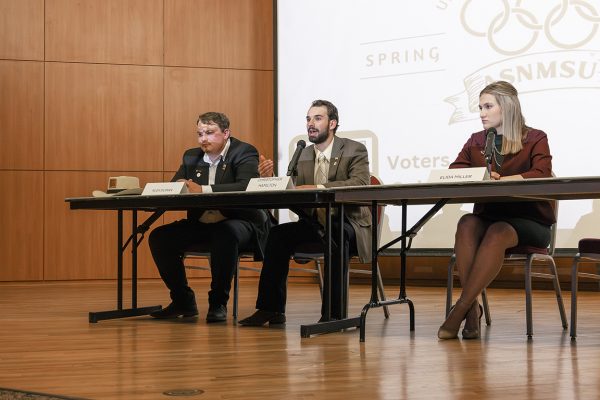
The Round Up also interviewed former presidential candidate, Anisa Sanchez, who said that while she understood the court’s ruling, she was disappointed. She explained that mistrust begins in the idea of still allowing this behavior to happen.
“I think now, just no justice prevailed,” Sanchez said. “And I’m just conflicted again at the court, with them saying, [fellow candidates] did this , but we’re going to let them continue, I think that’s exactly right where there’s a lot of mistrust, where the court is telling us as students that they did it, but that they’re not doing anything about it.”
She also emphasized that she believed the electoral process was fair and that the election board properly carried out their duties. However, she also explained that she felt that mistrust developed around ASNMSU and the institutions that operate within it.
“I think especially again with the court opinion coming out, it’s like well, these are student leaders, they did this, how am I supposed to trust ASNMSU,” Sanchez said. “My trust in ASNMSU is quite depleted as well. I’m sad about it, it’s just disappointing. I’m with the students, I’m extremely disappointed with ASNMSU, just what its subsumed to.”
Both Alhalholy and Miller agreed they would take community service and a public apology over disqualification any day.
“I am more than happy to do so if the Supreme Court and the election board decided that those are fair punishments then, by all means,” Alhalholy said.
ASNMSU adherence to New Mexico law
The New Mexico Open Meetings Act is a state law enacted to ensure that the meetings of all governing bodies who conduct policy or regulatory business are made open to the public.
ASNMSU, which is a policy-making body, contains a senate, multiple committees and departments. For this reason, they are to also abide by set New Mexico laws and statutes.
ASNMSU bylaws under Section 5-1-1 defines a policy-making body as “any ASNMSU board, committee, or other body that recommends or formulates policy.”
The bylaws also state that any governing body within the association is to post notice of a meeting at least 72 hours before a meeting occurs. That notice also needs to mention a meeting time and location.
Regarding the electoral violation meetings conducted this spring, it’s important to note there was no posted notice regarding the date, time or location of election violation hearings.
During Elida Miller’s supreme court hearing on Tuesday, April 16, ASNMSU Attorney General Alan Gonzalez discussed the process of the elections department as well as briefly mentioned the New Mexico Open Meetings Act.
“Regarding the New Mexico Open Meetings Act, I’m not very familiar with this act, as this was something that the previous attorney general worked really hard for and was really passionate about,” Alan said.
“But I will say that this election board worked really hard on the violation meetings and hearings, and they completely did it in a completely different way, so it was mostly time constraints. So…it was not that they weren’t aware of it, it was more a lack of timing and that they were putting a lot of effort into the violation’s hearings and punishment decisions.”
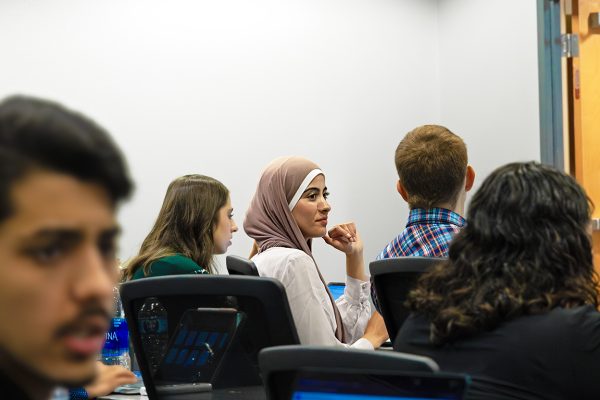
For perspective, ASNMSU released a statement on its Instagram account on April 5, citing that the election board would reconvene the week of April 8 to revisit election violation claims. However, no post or public notice was issued with specific details before the hearings began.
The next notice that included the term ‘election violation’ was made on April 11— on the associations Instagram. Similarly, no details were given to direct the public to the forum, which by state and ASNMSU law, is mandated for governing bodies.
There was also no mention of details regarding the hearings when referring to the 2024 ASNMSU elections packet and website. The only mention of election violations within the packet and website are the dates for when violation forms were due.
The Round Up requested an interview with the elections department for insight into the potential state law and ASNMSU bylaw violation. On the third request for interview, both Chief Elections Officer Tiffany Munguia and Deputy Elections Officer Anaya Gonzalez, refuted claims that state law was violated and said that processes occurred in accordance with state and ASNMSU bylaws.
“Although we are very familiar with New Mexico state law, of course, we’re not idiots, we know what’s going on,” Anaya said. “Going into it, we were more focused, I feel, on making sure that these meetings did happen in a timely manner, and that was just our main focus, was making sure that everything was done in a timely manner.”.
Anaya also mentioned that following the New Mexico Open Meetings Act is something that has been a problem across the entire association.
“The New Mexico Open Meeting Act is obviously very important to us, since we receive state funding, that is something that we need to be following,” she said.
The Round Up also reached out to several ASNMSU faculty advisors for an interview before the Supreme Court released its ruling of Alhalholy and Miller’s candidacy. However, they declined interviews at the time.
Conflict of interest allegations
Another item addressed during the appeals process was the possible conflicts of interest involving the election board’s decision. Alhalholy and Miller appealed that the disqualification was marred because a member of the election board, Kyle Richardson, violated Section 2-3-3 E of the ASNMSU bylaws, which state that an election board member must “Maintain ethical conduct throughout the entire election process in accordance with the NMSU Student Code of Conduct.”
Richardson belongs to vice-presidential candidate Christopher Hamilton’s fraternity, Sigma Chi, and was chosen by Hamilton’s campaign manager. Although he recused himself from voting, he was still present during deliberations.
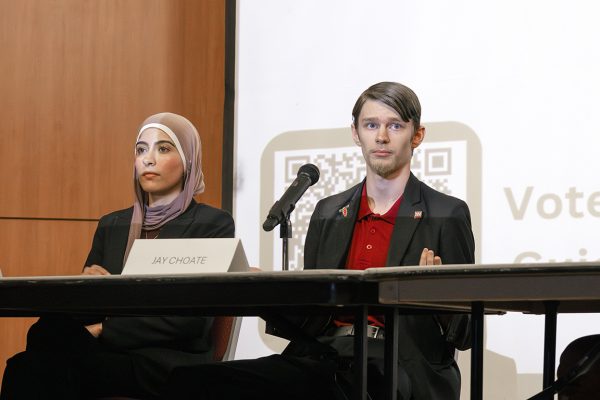
“We did bring this up to the board and it wasn’t really looked at, it was kind of just like, ‘eh. whatever.’ But there, there should have been actions taken to prevent conflicts of interest on the board,” Alhalholy said.
The elections committee denied the conflict-of-interest claims. During the court of appeals for Miller, Alan referred to them as “baseless” and “speculative at best.” Munguia later stated that everyone who needed to be recused during the meetings excused themselves.
“I will say that when concerns were brought to us about the impartiality of a specific member, we did our due diligence — we got them removed from the board,” Munguia said.
Anonymous violation claims produce unsubstantial evidence
Alhalholy and Miller also disputed the amount of evidence behind some of the violations. Many violation claims were anonymous, which Alhalholy expressed made them seem unsubstantial to her.
“There was no, there was no legality, you know, we can’t distinguish if they were real or not,” she stated.
In the court’s opinion, the chief justice wrote that anonymous violations were disregarded during the court’s deliberations.
“The Court’s decision of not entertaining anonymous violations is a relief sought fit to combat fraudulent interference in the high-integrity democratic process of ASNMSU. The decision was not made lightly or with the intent to silence or ignore student voices,” Loera said.
History of candidate disqualification in ASNMSU
This is the second year in a row that the unofficial winners of the ASNMSU election were disqualified. Last year, the court affirmed the election board’s decision to disqualify Hiram Camerena and Fateh Aswad after they were declared the unofficial winners.
During the 2023 election season, Camarena and Aswad were disqualified by the election board after being found ineligible to run. The ASNMSU bylaws state that candidates for the president or vice president positions must be fee-paying members of ASNMSU during the spring and fall semesters for a full year before their candidacy. Neither had been fee-paying members in the fall of 2022.
Alhalholy stated that she and Miller plan make changes during their terms as president and vice president to prevent similar situations from happening in the future.
“Elida and I have been in talks of this and during the summer local committee, she’s going to make a lot of changes, and she’s going to give opinions on what changes should be made to the election code. We really don’t want this to happen to another student,” Alhalholy said.

